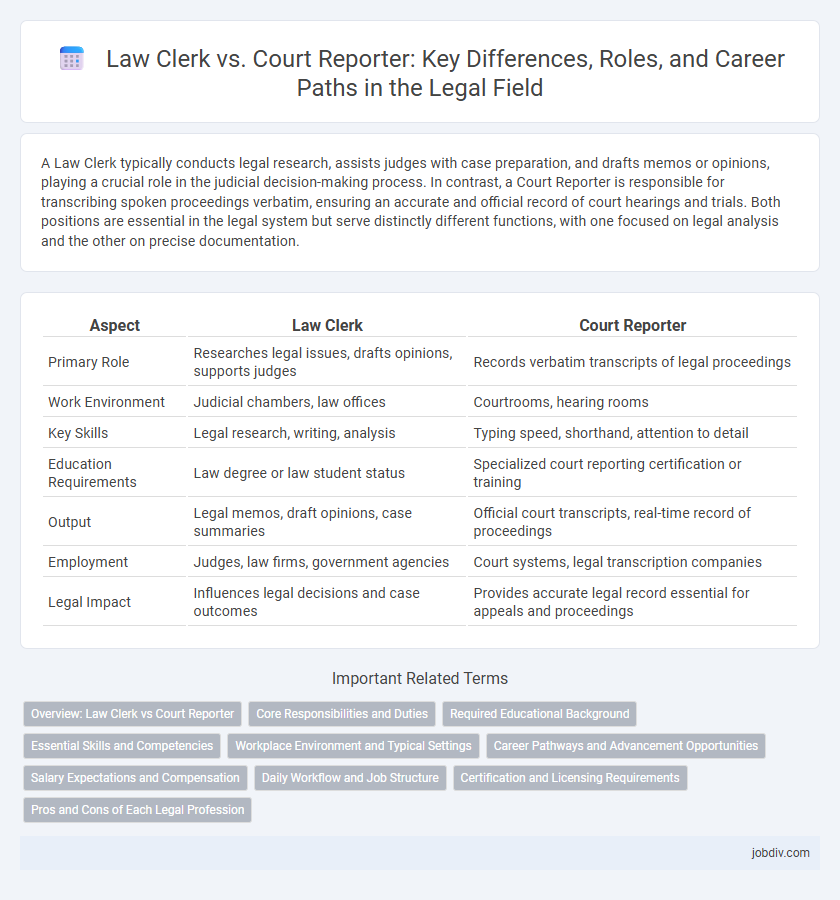A Law Clerk typically conducts legal research, assists judges with case preparation, and drafts memos or opinions, playing a crucial role in the judicial decision-making process. In contrast, a Court Reporter is responsible for transcribing spoken proceedings verbatim, ensuring an accurate and official record of court hearings and trials. Both positions are essential in the legal system but serve distinctly different functions, with one focused on legal analysis and the other on precise documentation.
Table of Comparison
| Aspect | Law Clerk | Court Reporter |
|---|---|---|
| Primary Role | Researches legal issues, drafts opinions, supports judges | Records verbatim transcripts of legal proceedings |
| Work Environment | Judicial chambers, law offices | Courtrooms, hearing rooms |
| Key Skills | Legal research, writing, analysis | Typing speed, shorthand, attention to detail |
| Education Requirements | Law degree or law student status | Specialized court reporting certification or training |
| Output | Legal memos, draft opinions, case summaries | Official court transcripts, real-time record of proceedings |
| Employment | Judges, law firms, government agencies | Court systems, legal transcription companies |
| Legal Impact | Influences legal decisions and case outcomes | Provides accurate legal record essential for appeals and proceedings |
Overview: Law Clerk vs Court Reporter
A law clerk assists judges by conducting legal research, drafting opinions, and preparing case summaries, playing a crucial role in judicial decision-making. A court reporter, on the other hand, creates verbatim transcripts of legal proceedings, ensuring an accurate and official record of trials, depositions, and hearings. Both professions require specialized skills but serve distinct functions within the judicial system.
Core Responsibilities and Duties
Law clerks conduct in-depth legal research, draft memos and legal documents, and assist judges in case analysis and decision preparation. Court reporters specialize in creating verbatim transcripts of courtroom proceedings using stenography or digital recording technologies. While law clerks support judicial decision-making through legal analysis, court reporters ensure accurate and complete record-keeping of all spoken words during trials and hearings.
Required Educational Background
Law clerks typically require a Juris Doctor (JD) degree or enrollment in law school, highlighting strong legal research and writing skills essential for assisting judges. Court reporters must complete specialized postsecondary training in court reporting, often earning a certificate or associate degree focused on stenography and transcription technology. Both roles emphasize precise understanding of legal terminology but differ significantly in their educational pathways and technical skill requirements.
Essential Skills and Competencies
Law clerks require strong legal research and writing skills, attention to detail, and critical thinking to analyze case law and draft legal memos. Court reporters must possess exceptional listening abilities, fast and accurate transcription skills, and familiarity with legal terminology to produce verbatim records of court proceedings. Both professions demand confidentiality, proficiency in relevant technology, and the ability to work under pressure in fast-paced legal environments.
Workplace Environment and Typical Settings
Law clerks primarily work in judges' chambers, law firms, and corporate legal departments, engaging in research, drafting legal documents, and case preparation in often quiet, office-based environments. Court reporters operate mainly in courtroom settings, depositions, and legal proceedings, requiring high concentration to capture verbatim transcripts using specialized equipment in fast-paced and sometimes high-pressure conditions. Both roles demand proficiency in legal terminology but differ significantly in workplace dynamics and interaction levels with legal professionals.
Career Pathways and Advancement Opportunities
Law clerks typically start their career by supporting judges through legal research and drafting opinions, offering a direct pathway to becoming attorneys or judges. Court reporters specialize in transcription and real-time courtroom documentation, with advancement opportunities including certification and roles such as supervisory reporter or legal transcription manager. Both professions require specialized training, but law clerks often experience broader career mobility within the legal system.
Salary Expectations and Compensation
Law clerks typically earn an average annual salary ranging from $50,000 to $70,000, depending on jurisdiction and experience, with additional benefits often including professional development opportunities and potential pathways to legal careers. Court reporters have a median salary around $60,000, with specialized certifications and experience in real-time reporting significantly boosting compensation, particularly in high-demand regions or federal courts. Salary expectations for both professions vary widely based on location, employer type, and individual skill sets, highlighting the importance of regional market analysis in compensation negotiations.
Daily Workflow and Job Structure
Law clerks analyze legal documents, conduct research, and prepare memos to assist judges in decision-making, working primarily in courtrooms and law offices. Court reporters focus on accurately transcribing spoken proceedings in real time using stenography or voice writing technologies, ensuring an official record of trials, depositions, and hearings. The job structure differs as law clerks engage in analytical and preparatory tasks with deadlines tied to case progress, while court reporters maintain continuous attention during live sessions for precise documentation.
Certification and Licensing Requirements
Law clerks typically require a bachelor's degree and often pursue certification through organizations such as the American Association for Paralegal Education (AAfPE) or the National Association of Legal Assistants (NALA) to enhance their credentials. Court reporters must obtain certification from the National Court Reporters Association (NCRA) by passing skills tests in shorthand, transcription, and written English, with some states mandating licensure to practice. Both professions demand specialized training, but court reporters face stricter licensing requirements related to state regulations and accurate stenographic documentation.
Pros and Cons of Each Legal Profession
Law clerks offer critical legal research and drafting support, enhancing case preparation with detailed memos and briefings but often face long hours and the pressure of meeting tight deadlines. Court reporters provide accurate, real-time transcription of legal proceedings, ensuring an indispensable record for appeals and transcripts, though their work requires intense concentration and mastery of specialized equipment. Both roles demand strong attention to detail and legal knowledge, yet law clerks typically engage more directly with case strategy, while court reporters hold a unique niche in courtroom documentation.
Law Clerk vs Court Reporter Infographic

 jobdiv.com
jobdiv.com